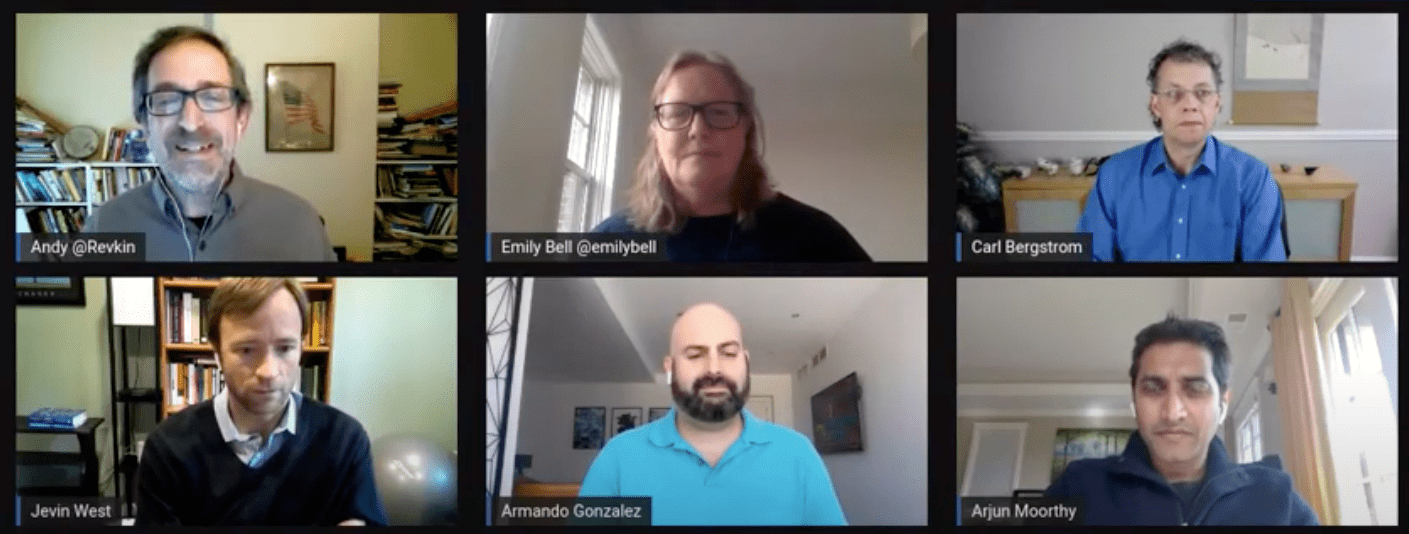Center for an Informed Public (CIP) director Jevin West and CIP affiliate researcher Carl Bergstrom were featured panelists during a recent livestream discussion hosted by Andrew Revkin, a former New York Times science and environment reporter who is now the director of the Initiative on Communication & Sustainability at The Earth Institute at Columbia University.
The April 29 episode of Revkin’s Sustain What show, titled “Navigating the Communication Storm Around the COVID-19 Pandemic,” also included Armando Gonzalez, CEO of New York City-based financial services data analytics firm RavenPack; Arjun Moorthy, CEO of San Mateo, California-based TheFactual.com; and Emily Bell, director of the Tow Center for Digital Journalism at Columbia University.
Bergstrom, a University of Washington Department of Biology professor and epidemiologist, and West, an associate professor at the UW Information School, discussed the genesis of “Calling Bullshit,” a popular course that the two developed and co-taught at UW starting in 2017 and is the basis of a forthcoming book set to be published in August.
“We’ve really taken a lot of inspiration from what’s going on in the humanities and the work being done in the humanities because people there are still used to bashing ideas against each other and trying to find the reconciliation or, alternatively, letting the good ones slump out the bad ones,” Bergstrom said during the discussion.
“But we just aren’t doing a good job of that in STEM education right now, is my opinion. We’re really good at teaching mechanics,” he said, “but it’s very seldom that we come in and present students with bad statistical analyses or bad arguments and ask them to piece that apart.”
Later in Revkin’s show, Bergstrom and West also explored the dangers of information overload amid the ongoing coronavirus public health emergency.
“There’s plenty of research that shows being super tired is like being drunk, West said. “So think about it this way,” if you’re always fatigued by all the information you’re consuming, “you’re kind of information drunk. And that makes for poor decisions. You don’t want to be driving in the middle of the night when you’re super tired because you might go off the road. Well, you also can ‘go off the road’ on the information highway, too.”
There are various forces at play with the current infodemic, but West discussed how technology can overwhelm our abilities to consume and process information, especially during a deeply disruptive, distressing and uncertain situation like the COVID-19 pandemic.
“…[A]lgorithms and platforms are great at keeping us addicted to the platforms. They make us compulsive if we’re not compulsive already. So you have these two things: Unlimited information if you want it and platforms running experiments … every second of the day to figure out how to stick us to that platform,” West said. On top of that, “the desire to make good decisions around a really scary event … make it difficult to turn away.”
But, as West said, the “best thing we can do sometimes is to turn away,” slow down and be more thoughtful and strategic in how information is consumed, processed and understood. Otherwise, the abundance of information will “cloud” the ability to process it.



